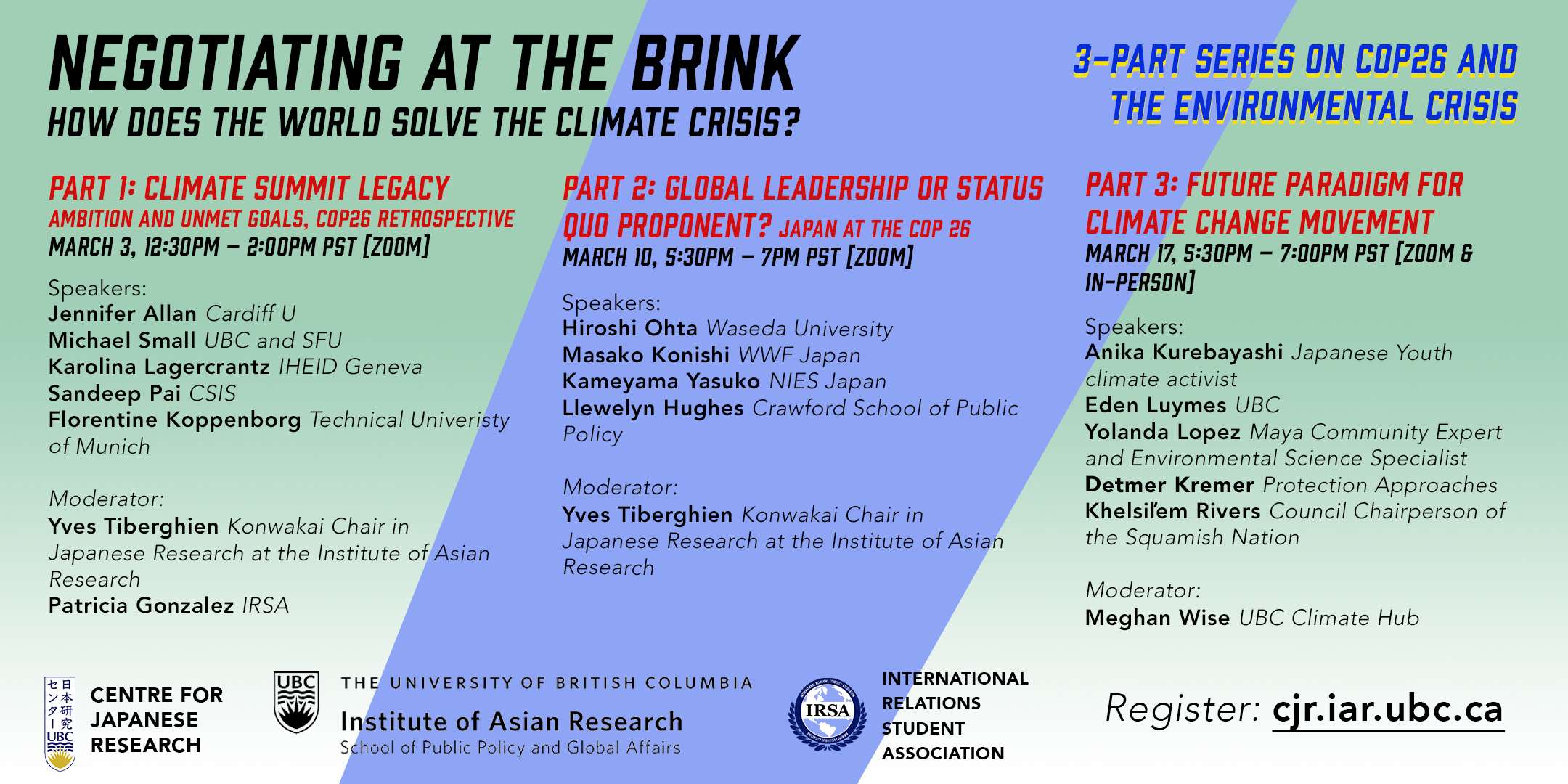
Climate change is one of the greatest challenges our world has ever faced, already devastating our environment, economy, and our health. The difficulty of addressing climate change is that it requires global coordination. World leaders have made attempts through conferences and accords but the proposed measures will not stop global temperatures from rising above 1.5 ℃–the limit set by the International Panel on Climate Change to avoid the worst effects of climate change. This has pitted climate activists who demand more robust climate governance against state actors who must balance environmental concerns with other political agendas. To address the politics of climate change, the Konwakai Chair in Japanese Research at the UBC Centre for Japanese research, in collaboration with the International Relations StudentAssociation (IRSA), will host a three-part series event in March.
Part 1: Climate Summit Legacy: Ambition and Unmet Goals, COP26 Retrospective [Remote: ZOOM ONLY]
March 3rd, 2022
12:30PM – 14:00PM PST // 15:30PM – 17:00PM EST
20:30PM – 22:00 PM UTC // 21:30PM – 23:00PM CET
March 3rd, 2022The first event will provide a critical evaluation of the outcomes of COP26, giving a multi-level analysis of implications, with a special focus on its impact on the Asia-Pacific region. This will be led by highly esteemed scholars and professors such as professor Michael Small, speaking of the strengths and weaknesses of the climate conference in creating a more sustainable future.
Speakers:
Jennifer Allan (key UK expert on COP 26)
Michael Small (expert on Global Governance and Climate policy)
Karolina Lagercrantz (IHEID Geneva, MA student)
Patricia Gonzalez (VP External, International Relations Students’ Association at UBC)
Part 2: Global Leadership or Status Quo Proponent?: Japan at the COP 26 [REMOTE: ZOOM ONLY]
5:30PM – 7PM PST // 8:30PM – 10:00PM EST; March 10th, 2022
10:30AM – 12:00AM JST; March 11th, 2022
The second event will focus on the Japanese environmental agenda. Japan has played a leading role in climate change policy in the past. However, after making some bold commitments toward carbon neutrality in 2050, Japan appears to play a more defensive role at COPD 26. What are the key drivers behind climate innovation and the energy status quo inJapan? This panel brings together leading experts, civil society leaders, and a top political leader to discuss Japan’s critical role in addressing the global climate emergency.”
Speakers:
Hiroshi Ohta (Waseda University)
Dr. Masako Konishi (WWF Japan) (TBC)
Dr. Kameyama Yasuko (NIES Japan, Social System Division Director) (TBC)
Dr. Llewelyn Hughes (Crawford School of Public Policy, scholar on climate policy inJapan) (TBC)
Moderator:
Yves Tiberghien (Konwakai Chair in Japanese Research at the Institute of Asian Research)
Part 3: Future Paradigm for Climate Change Movement [HYBRID: ZOOM AND IN-PERSON]
5:30PM – 7PM PST // 8:30PM – 10:00PM EST; March 17th, 2022
9:30AM – 11:00AM JST; March 18th, 2022
The third event of the series will cover the normative considerations of the future of climate justice. We will primarily focus on young activists and students, as well as indigenous speakers who are involved in the climate movement, such as Anika Kurebayashi. They will address what climate justice means and what actions need to be taken to create a just future for our planet.
Moderator: Meghan Wise (UBC Climate Hub)
Anika Kurebayashi (Youth climate activist in Japan), Japan)
Eden Luymes (UBC Political MA candidate)
Dr. Yolanda Lopez (Environmental Science Specialist & Maya Community Expert)
Detmer Kremer (Policy and Communications Officer, Protection Approaches)
Here are the recordings of the videos:
Part 1: Climate Summit Legacy: Ambition and Unmet Goals, COP26 Retrospective
Part 2: Global Leadership or Status Quo Proponent?: Japan at the COP 26
Part 3: Future Paradigm for Climate Change Movement
Follow us for more events like this!
Twitter – @ubcCJR
Facebook – www.facebook.com/CJRatUBC
Newsletter – https://cjr.iar.ubc.ca/news-events/newsletters
